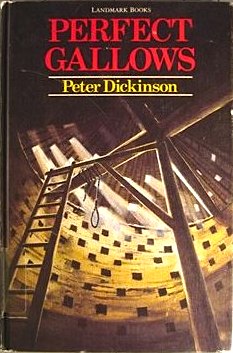Peter Dickinson’s Perfect Gallows is the quintessence of a Peter Dickinson mystery, and I think it may be my favourite. Like many of his mysteries it concerns a death in upper class England during World War II, with a present day (1988) frame story. Unlike most of the others, there’s no investigation going on in the present day. There’s nothing left to discover. What we have instead is the story being told of the events leading to a murder, and the revelation of why Adrian let it pass as suicide. We also have a portrait of Adrian—a young man in the war, a grown man in the frame — who is a supremely selfish actor. And we have a deft evocation of a time and a place that has gone forever.
Dickinson has written fantasy and science fiction, but there’s no way this one could possibly be considered even on the edge—this is a straight mystery novel. I love it though.
The book begins with the discovery of a body hanging in a dovecote—the “perfect gallows” of the title. There’s no mystery about whose body it is, only about how it got there. We go both back and forward in time to find this out.
In the early days of 1944, Andrew Wragg goes to visit his dead father’s rich relations. He finds them monstrous. He has his own plans, and they don’t include inheriting money—he intends to become an actor and he has his whole life arranged, as long as he doesn’t get killed the moment he is called up. The cousins do manage to tempt him though, with the prospect of playing Prospero. The novel is the story of the production, with the events leading up to the murder and the events leading up to D-Day as part of the background to this.
There’s a lot here. I’m a sucker for a story about putting on a play, and this is a good one. Adrian’s whole career is implicit in his beginnings, his intentions, and the casual mentions it gets as he tells the story. He is an actor in the style of Olivier, only younger, and far more self-centered. And The Tempest, with its themes of colonial conquest, power and freedom, echoes all through the story. The production is mostly local amateurs, with one other great actor: the murder victim—Adrian’s great-uncle’s African servant, who plays Caliban.
Samuel Mkele is a great character. At first he seems like a cliche, an African servant brought back from the diamond mines where the great-uncle got rich. Then he becomes a real complex character, and all the time we know he’s going to die. He’s a great murder victim for a story of this kind—we have the upper class family and the lost heir and all of that, but the person who really matters is the servant. He’s the place where the heart and focus of the novel lies. And Dickinson goes straight at the racism of the period without committing any racism of his own—he acknowledges the difficulties of being from another culture and of another colour and the prejudices Mkele has to cope with.
Indeed, this is part of what makes the murder so fiendishly clever—very mild spoilers coming up, not for who did it but for who didn’t do it. The death is disguised in two frames—first the fake suicide, and secondly the idea that it was a lynching by American soldiers from the nearby camp.
This is a book about a man who puts his loyalty above his life, and another man who puts his potential career above seeing justice done. It’s short, 234 pages in my Arrow edition, and I can generally read it in an afternoon—which is good, because it’s one of those books I can’t put down once I start it, no matter how many times I have read it. It’s out of print and hard to find, but check your library. If you like this, he has half a dozen other mysteries of this calibre.
Jo Walton is a science fiction and fantasy writer. She’s published two poetry collections and nine novels, most recently Among Others, and if you liked this post you will like it. She reads a lot, and blogs about it here regularly. She comes from Wales but lives in Montreal where the food and books are more varied.










